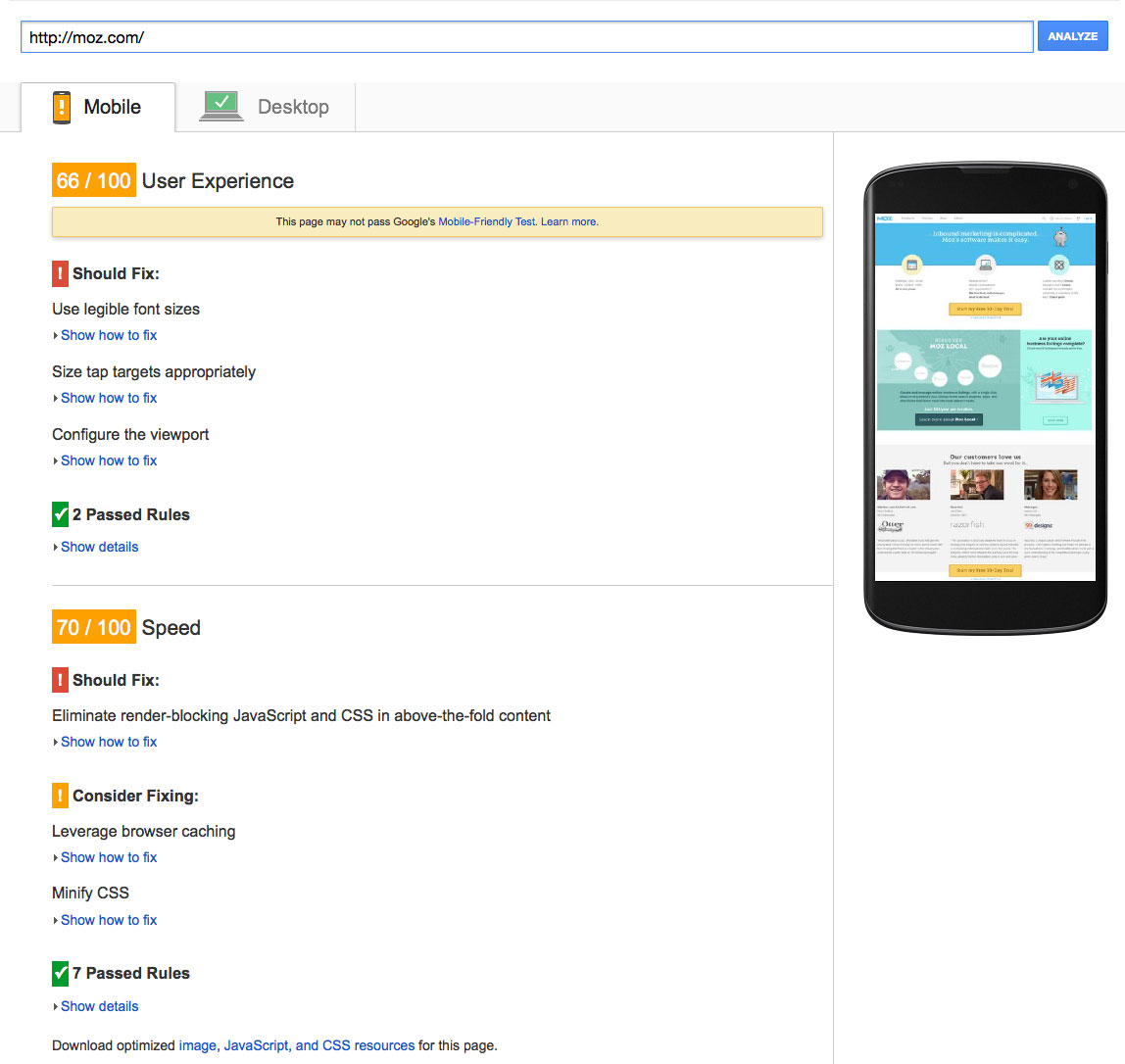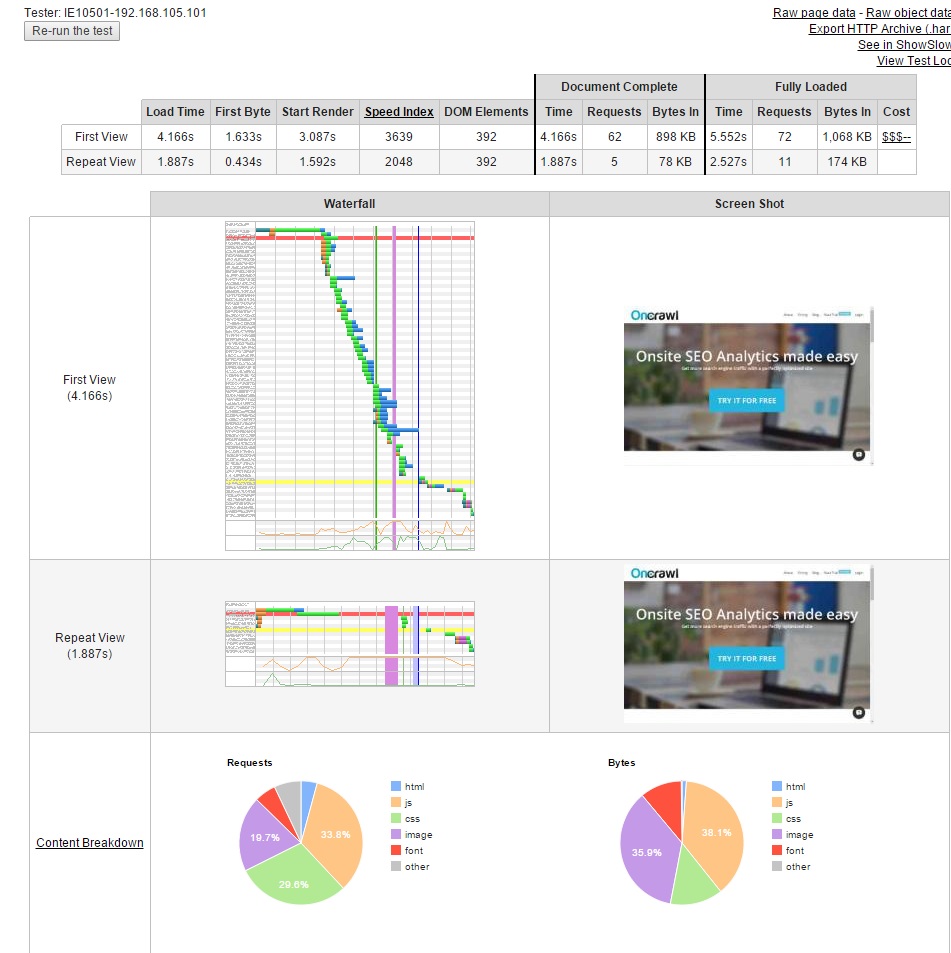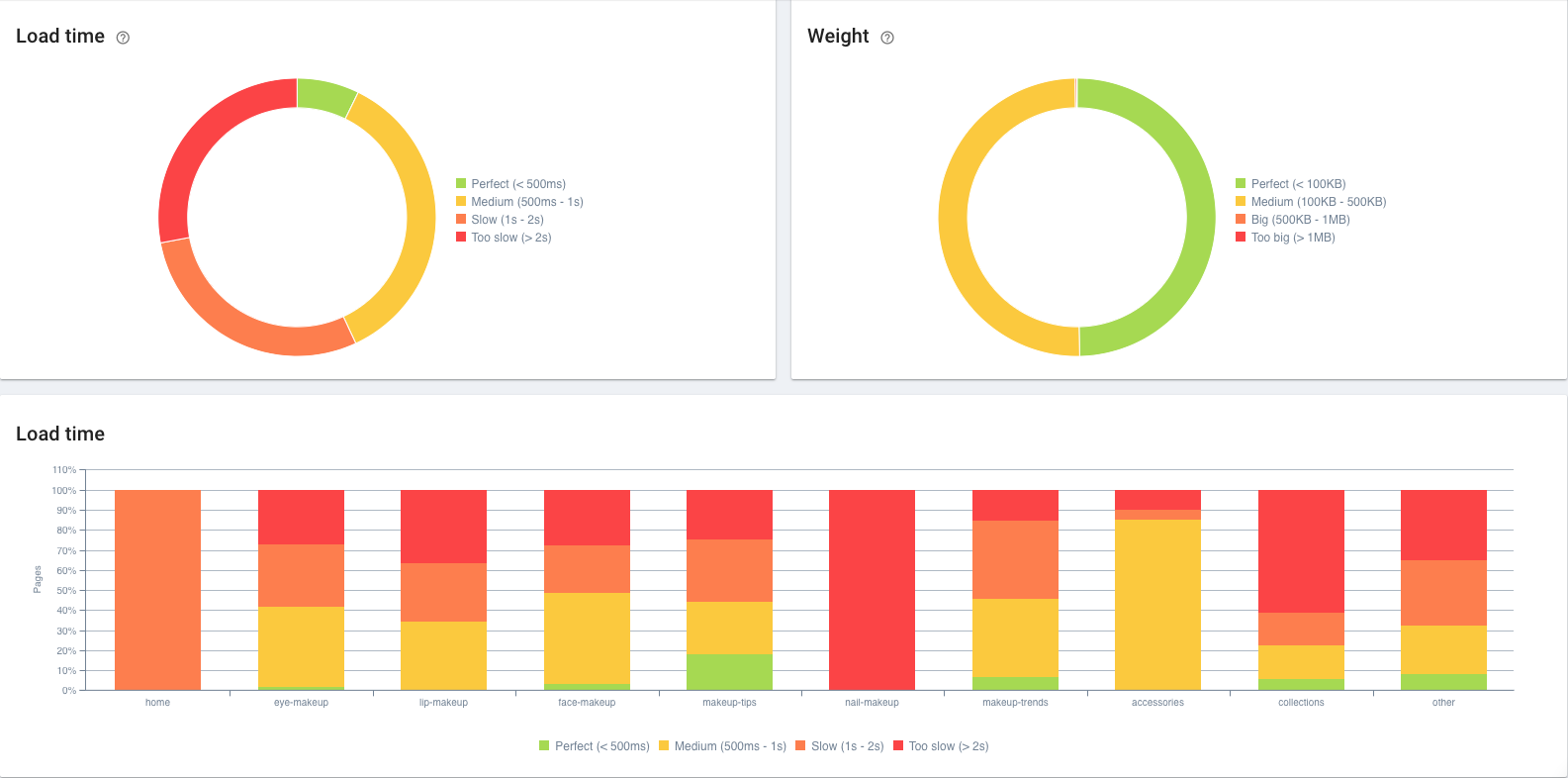In 2010, Google announced that page speed would impact your website ranking. It actually refers to the time a visitor have to wait until your page is completely loaded. On average, a page load for e-commerce website takes 7 seconds meanwhile the ideal load time is around 3 seconds or less.
As a matter of facts, it has an impact on your audience user experience. A bad UX can cost you a loss of revenue if your target have to wait too long to get what they are looking for. They will just close your website. And above all, a slow page load is penalized by the search engines and has an impact on your ranking, both on mobile and desktop devices. Google says:
“A search result for a resource having a short load time relative to resources having longer load times can be promoted in a presentation order, and search results for the resources having longer load times can be demoted.”
Actually, Google compares your site to your competitors on a specific segment and attributes a bonus point whether you are the fastest. But be careful, that marks is not given unilaterally : it takes in account the country, device or network.
So, there is a few factors you should focus on to improve your page speed.
What can lower your page speed?
- Your host: you get what you paid. In the long run, a cheap offer can damage your page speed. Pick the right host that fit to your business size.
- Too large images: images which are too heavy to load can really lower your page speed. It is often due to extra data included in the comments or to a lack of compression. Prefer PNG for images that do not require high details like logos and JPEG for photos.
- External embedded media: external media like videos are highly valuable but can largely lower you load time. To gain some load time, host the videos on your own server.
- Unoptimized browser, plugins and app: you should test your website on all browsers since they do not load your site in the same way. Moreover, apps like Flash can seriously lower your page speed.
- Too many ads: more than just bothering your visitors, lots of ads have the drawback to slow down your page speed.
- Your theme: some highly designed themes containing a lot of effects can penalized your load page.
- Widgets: some social buttons or comment areas can have an impact of your page speed.
- Double-barreled code: if your HTML/CSS is not efficient or too dense, it will lower your page speed.
What tools can I use to improve my load time?
There is a few tools you can use to improve your page speed or simply to see how your website is working.
Page speed Insights
This classic displays a page speed score between 0 and 100 and gives you all the keys and advices to improve your page load.

Webpage test
This Google tool offers a free speed test providing charts about page speed optimization.

YSlow
This plugin quickly shows you how your website is performing and gives you insights to improve your site speed.

YUI Compressor
This tool will help you compress your code by minimizing JavaScript and CSS.
Oncrawl
Our tool offers a clear overview of your page speed performance and help you know which pages you should optimize in a glance.




[…] pages load in less than a second on mobile […]
Page speed sure affect your google rank, but only a little. In fact, i still find many site load slower than 10 secs in top 10 hard keywords
It might not have a huge impact on google rankings right now, but it probably will in the future. Also, what good does your high google rankings do for you when your visitors will leave after having to wait too long for your page to load? Think about that…
[…] search has overpassed desktop searches in 2015. In parallel, load time is an important ranking factor. In that context, mobile users are looking for a great user […]
Google Page Speed it’s very useful tool for speed and user experience. For SEO you can make a good progress optimize your site speed. Thank Emma for sharing this great content.
Great tips to decrease page load time. Page load time is very important for rankings good on search engines as well as for increasing traffic and making sales because nobody likes slow websites. My blog page load time is very high but anyhow i decreases it with the help of your blog post. Thanks a lot for sharing. :-)
It’s true that page speed matters a lot, however I have researched hundreds of top-ranked sites which don’t care about it all. After all content, UI and most importantly uniqueness of your website is that matters. I could managed to achieve 98/100 with one of my websites but could hardly feel any difference in page rank or so, in the other hand a different blog I own is relatively very slow yet outperform rest of my site because of its uniqueness.
I agree with Benedikt, High search rankings won’t do any good if your visitors will just wait too long they will leave instantly. This is the reason why i’m planning to migrate from my old shared hosting account to optimized wordpress hosting at bluehost. I don’t want my site to suffer from bad neighborhoods and slow speeds.
Thanks for the article; I am trying out your tool.
Google’s intent to push Accelerated Mobile Pages is unmistakable. An updated AMP testing tool is available in your Google Search Console. It combines AMP and structured data errors within its live preview to simplify your processes of ensuring code are valid. The tool is efficient on both mobile devices and desktop and utilizes Google’s “live web-search infrastructure” to evaluate your AMP pages with the real Googlebot. This means that the results show in real time.
A great actionable post. Even though page speed and load time don’t appear to be a massive factor, it’s always beneficial to consider SEO factors which are directly related to user experience on your website. I wish more online marketers would focus on user experience and creating web awesomeness.
It’s a bit of a contradiction that Goole likes to encourage developers to make websites as fast as possible but whenever I do a page speed test it shows Google Analytics as being the one major factor that slows down the entire page speed load time!
Ryan, I agree with you.
I solved this by copying the google codes on my site, huge improvements.
Using detectionchange services, I can update their code asap.
Afterwards, I definitively remove third parties: statistics, fonts…
Hello from 2017! I’ve just checked homepage of Amazon via Chrome inspector: DOMContentLoaded: 3.39; Load: 8.68; >100 requests; 4.3 MB. First visible data on my screen appeared around (!) 1 sec. Is it fast?(in terms of user perception). I would say – YES!
This is why User Experience (UX) is so important and therefore it’s much more important for us to give our users an appropriate visible data as fast as possible, instead of focusing on Page Load Time. We are using Math as a proxy for what’s happening, but it doesn’t tell the whole story.
Once user gets what he wants, he keeps using site. And onsite analytics tracks his behavior. That’s what truely important.
I have 5 CSS in my website and every site analysis suggesting that I should use limited no of CSS. The problem is that many of the CSS file are for Bootstrap and animations. I have compress those CSS for better page load time but unable to assemble them together. My question is whether too many (almost 5) “COMPRESSED” CSS will effect my page load speed or not.
The load time of a web page plays a vital role in SEO when you are doing this on an advance level. Good job Emma. It helps me a lot to understand the parameters that can lower my page speed.
Thanks for sharing the post. The load time of a webpage is a vital ranking factor. Using CDN is also a good practice in order to enhance the load speed of a page.
While it’s true that doing all this compression and caching and using a CDN and all of these things will help with your page speed, they really don’t do much if your site is hosted on some budget shared $2 per month hosting. If you do all these things and find your site still loads like a snail, you’re gonna have to come to terms with the fact that you’ll have to pony up some cash and get better hosting if you want your site to be faster.
I would have to say I find low bounce rate and decent time spent on page to be much more valuable and representative. I think these two metrics can tell much more about how good your website is, both in terms of content and design, than simple pageviews.
Still, having said that, this is a good article and every improvement is, well, an improvement.
Hello Emma,
A very informative post I must say.
I often see my website images are quite big and they reduce my page speed due to their space. I use to fix my optimize images pop-ups by installing Optimus image optimizer plugin which provides quality compression without giving any loss to my image. This is very useful because it doesn’t affect the quality of the image. It also helps to convert my images to the .webp format which makes my website ‘s peed faster.
Hello Emma, I guess you should add on to this list Google’s new Lighthouse extension for chrome that gives so much detail about the website performance with a focus for mobile devices. And it is crazy how low marks it gives for too many great websites. One of my site’s page score is 87 on Page speed insights but keeps failing in Lighthouse with scores around 40, and there are so many mission impossibles in that report that i am not able to fix :(
Such a brilliant article. Loved it and implemented the suggestions. Thanks a lot :)
Well, the speed of the page does not quite affect positioning but also the user who first: stays on our site, come back to us later and best of all can advertise us further.